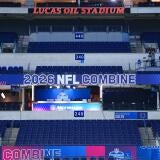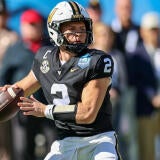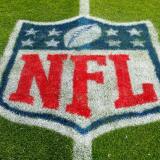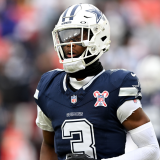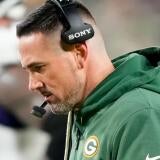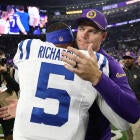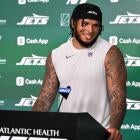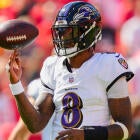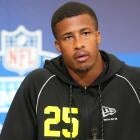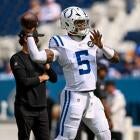Kurt Warner goes Hollywood: Inside 'American Underdog,' the true story behind an NFL legend's family and fame
An exclusive behind-the-scenes look at the Hall of Fame QB's upcoming movie

On Feb. 3, 2002, Andrew Erwin was preparing to shoot the first and only Super Bowl of his career. Working as a cameraman for ESPN, he was about to capture a duel between future NFL legends. On one sideline was Tom Brady, then 24 in his first of many championships to come. On the other: Kurt Warner. Two years earlier, the latter became the talk of American sports, going from undrafted rookie to grocery clerk to Midwestern arena football star to Super Bowl MVP for one of the best offenses in league history.
"(For) sports fans, it was always kinda the Holy Grail," Erwin says of Warner's improbable rise. "It was the epitome of any kind of underdog story."
Now here was Warner, fresh off his second MVP season, looking to snag his second Lombardi Trophy in three seasons. In the end, Brady got the best of the matchup, denying the Rams a dynasty and instead beginning one with the Patriots. But Warner's journey had already been cemented in sports lore by that point. And it's not even what Erwin remembers most about that day.
"I was sitting there on the sidelines," he says, "and I remember before the game, watching (Kurt) look at the stands, and seeing this beautiful, spiky-haired, tough-as-nails woman sitting there -- his wife, Brenda. And I always was intrigued, like, 'I wanna know more about that story.'"
Nineteen years later, that story is hitting the big screen. Erwin and his brother, Jon, have parlayed a filmmaking hobby into a career, trading sidelines for film sets, and the Warner family is at the center of their biggest project yet: "American Underdog," in theaters Christmas Day.

A family of underdogs
The movie, distributed by Lionsgate and produced by Mark Ciardi ("Invincible," "Secretariat," "The Way Back"), was originally subtitled "The Kurt Warner Story" for obvious reasons. No one ascended to Super Bowl stardom quite like the Iowa-born quarterback.
Not a single team called Warner during the 1994 draft. The Packers cut him loose after a single training camp. He resorted to stocking shelves at a Hy-Vee, then spent four years of his mid-20s -- theoretically the prime of his career -- slinging passes in the Arena Football League and NFL Europe, both now defunct.
And then, just like that, he was the man. Forced into action with the Rams after starter Trent Green tore his ACL in the 1999 preseason, Warner proceeded to headline "The Greatest Show on Turf," posting historic numbers (4,353 yards, 41 touchdowns, 13 interceptions) that still look elite in today's pass-happy game. He capped his breakout by leading his team to its first Super Bowl win in nearly 50 years.
"American Underdog" certainly pays tribute to this real-life gridiron fantasy. The Erwin Brothers stage Warner's AFL stint with proper ridiculousness; his arena debut plays like a kind of rural circus, with Kurt strolling past live farm animals on his way to the field, all while "Get Ready for This" blares '90s dance vibes. Meanwhile, a culminating act involving Warner's famous Rams debut is smartly intercut with real game footage, reviving the unlikely stakes of a Midwestern castoff taking on Ray Lewis and the Ravens. Longtime Rams fans will appreciate cameos of familiar names like Marshall Faulk and Isaac Bruce, or recreated CBS play-by-play from Gus Johnson.
"Holy cow, that day, when I came in," an emotional Johnson told the Erwins upon returning for the film, "I was a young announcer, and I thought I'd been given this gift of this great game of Ray Lewis versus Trent Green, and Trent Green gets hurt ... and I thought it was gonna be a clunker of a game. And then all of a sudden, the game came to life, and I had no clue that one day it would be the ending of a major motion picture."
And yet this isn't a movie about football as much as a movie about family. Why? Because this is Kurt Warner's story, remember. This is how he tells it. This is how he lived it. It's his biopic, and in his eyes, his story would never even exist if not for those by his side.
"Kurt and Brenda had us over to their house in Phoenix," director Andrew Erwin explains, "and we sat down, and the first thing that (co-director) Jon asked them is, 'What do you see your story as?' And Kurt said, 'I want people to know about the struggle we had as a family, how we fought to stay together. With me and Brenda, it's our partnership, and it's really about the relationship (we) had with my son, Zack.'"
Kurt met Brenda while he was in college at Northern Iowa, and they married while he played for the AFL's Iowa Barnstormers. Brenda was previously divorced with two kids, discharged from the Marines after her ex-husband accidentally dropped their son, Zack, leaving the little boy blind from a traumatic brain injury. Brenda had also endured infidelity and, later, the tragic loss of her parents. Long before Kurt became a household name, this woman and her son became his truest teammates.

"We definitely have a lot of cool football stuff in the movie," says Zachary Levi ("Shazam!"), who plays Warner in the title role. "But I've been telling people, it's like 25 percent football, but it's 75 percent real life. It's falling in love, it's romance, it's then: what does that relationship look like when there's an actual family unit that starts being created? What is it like for Kurt to then be a part of helping support that family and love that family through thick and thin? There are tough years where they were literally pinching pennies for gas money. That is really the heart of what this story is about. The easy visual is, well, 'American Underdog,' that's Kurt. But the reality is, there are many underdogs in the movie. Kurt is one of them. Brenda is another."
And Zack? He's the most important of them all.
"This movie was never gonna be made if Zack's story wasn't told," Kurt says. "So many sports movies, I feel like the story is, 'Here's the young man, and he's trying to make his dad proud of him.' Like, we're all trying to make Dad proud of us. (But) I was trying to make my son proud of me. He was the one that was teaching me and inspiring me. And that, to me, is such a huge message, because we think to ourselves, 'I'm in the position of leadership. I'm the one that has to lead. I have to inspire. I have to teach.' And, to me, we need to be taught and inspired and learn from anybody and everybody that God puts on our path. And Zack did that for Brenda and myself."
"From Day One, it's like, we're not making a movie just to make a movie, the rags-to-riches (story)," Kurt continues. "The right movie was that relationship: Brenda to Zack, me and Zack, and how he brought us together in some unique ways."
It's no wonder that Warner's bond with his adopted son is the most moving piece of "American Underdog." Eleven-year-old Hayden Zaller, who is also blind, portrays Zack in his big-screen debut. At every momentous turn of Warner's on-field journey, the little boy's radiant innocence is there. When Kurt marries Brenda, all worries around the QB's fading NFL prospects dissipate as Zack sings directly to his new dad at the wedding dance. And when Kurt is about to take the big stage, sharing a final pre-game moment with Brenda in the Rams' locker room, it's Zack's handwritten words that ring louder than any stadium cheers: "I love you, daddy. You play your football game. I play with my black truck."
Recreating Kurt
Just because "American Underdog" prioritizes Warner's off-field growth doesn't mean the movie denies football's role in the story. Kurt, along with Brenda, served as an executive producer for the production, but he was overly eager to revive his gridiron presence. So much so that, during on-location shoots in Oklahoma City and Frisco, Texas, including the Dallas Cowboys' indoor field at The Star, the 50-year-old Warner kept trying to put on the pads.
"There wasn't temptation, there was begging on my part!" he says. "To get me out there and let me throw a few passes in the middle of this movie!"
Jon Erwin jokes that "it came down to an insurance issue," not allowing "the real Kurt Warner to be tackled and hit," but it never put a damper on Kurt's attempts to literally lend a hand.
"The amount of times he pleaded with us to make him the stunt double for Zachary Levi," Andrew Erwin recalls, "and we were like, 'C'mon, Kurt, we can't,' and he kept saying, 'I can still do it. I can do it better than that guy. I can do it better than that guy.'"
In the end, Warner did lend a hand, literally, with the Erwins inserting a shot of his hand during a scene in which he signs a contract for a car. ("It's actually pretty obvious if people are watching," Levi says, "and you can tell because it's all, like, mangled, his knuckles and everything, from being a quarterback so long.") Warner also joined the production's football coordinators, including former AFL star Clint Dolezel, in training Levi how to play QB.
More than anything, he brought the humble spirit of his story to the set.
Director Jon Erwin recalls a blizzard hitting Oklahoma during production: "And I woke up the next day, having said, 'Stay away from the set for the next week,' and I got a call from the hotel lobby desk, and they said, 'Uh, there's this guy shoveling cars out of the snow in the hotel,' and upon further investigation, it's the NFL legend Kurt Warner, just out in the snow shoveling."
Warner was there "every step of the way," Erwin adds, serving as a live example of the man and family they sought to portray. One of the directors' favorite memories involves the movie's recreation of Wile E. Coyote's, the Iowa bar where Kurt and Brenda first met.
"As we were wrapping that location out," Jon says, "Kurt asked if he could just have a moment where the real Kurt and Brenda Warner could dance out on that dance floor. And the whole crew gathered around, and they shared a dance in this dramatized venue where they had first fallen in love, and it was really special."
The intimate, hands-on involvement from the Warners helped sell Levi on the title role. Best known as the buffed and goofy lead from surprise superhero hit "Shazam!" (2019), he was a top choice of the Erwins but only became available due to pandemic-related delays on other projects, including the "Shazam!" sequel.
"And obviously learning how to throw a spiral at 40 is not the most ideal," Levi laughs. "At the end of the day, I was on that field with a whole bunch of actual football players, and I would get some pats on the back, like, 'Hey man, pretty good job!' That's all I was hoping for! All I wanted was for all of those real football players to be like, 'Y'know what? Not bad.' And Kurt ... felt like I was giving good Kurt vibes."

Levi, who took plenty of hits during filming but also had two stunt doubles -- one for "literally getting leveled by linebackers" -- is adamant he'd still have no shot at the NFL after playing an NFL icon: "Oh no, absolutely not. Not a chance ... If I could put on a little more -- no, I couldn't. I'm 41 years old, what are we even talking about? I would be on the sidelines, cheering 'em on, (like), 'You need some water?'"
But he considers it an honor to wear Warner's No. 13 on the big screen. And not just because wearing pads was more comfortable than superhero tights.
"I watched Kurt literally play as a Cardinal in the Super Bowl against Ben Roethlisberger and the Steelers (in 2009)," Levi says. "I still give him s--- for that to this day ... I was at the game, and I loved Kurt Warner because I loved him even before ... and I was like, 'Oh my gosh, another Cinderella story (is) going on.'"
More than that, Levi found parallels between Kurt's journey and his own. "American Underdog," he says, is like a "love story to the working class, to middle America," to anyone who needs a little more faith in themselves or a higher power.
"Ever since I was 4 years old," Levi explains, "I really believed that God was like, 'This is what you're gonna do.' I could feel the vision put upon my head, put in my heart. I could feel it in my bones. Even when I would tell my parents, like, 'Yeah, I'm gonna be an actor when I grow up,' there'd be a lot of patting on the head and, 'Sure you will.' Because what are the odds? (With Kurt), it was not just making it into the NFL and becoming a starting quarterback in the NFL, but taking your team all the way to the Super Bowl and then winning MVP. To make it as a successful actor in Hollywood, the fact that I'm talking about how I got to be Kurt Warner in his biopic, it's very rarefied air ... (And the movie's about) what Kurt learned out in the desert, in that time away, where he thought he was failing."
'Don't screw up this story'
"Faith, family, football" has become something of a cliche; the mantra has no doubt appeared on countless coaches' desk plaques or players' social media profiles. And "American Underdog" doesn't totally avoid the trappings of smaller-scale romance or inspirational sports drama. The characterizations of Warner's NFL mentors, for example, are so pointed that his Rams coaches often feel like either best friends (Dennis Quaid as a warm and fuzzy Dick Vermeil) or cold adversaries (Chance Kelly as offensive coordinator Mike Martz). Levi, meanwhile, looks 35 the whole time, never more apparent than his introduction as a college "kid" in full physical form.
But here's the thing: cheesy as some of it may be, it's still a fun and worthwhile ride because of the truth behind it. The longer you spend with Kurt and his ragtag little family, the more you care for them. As a result, the football action -- grounded with close-ups of Warner settling in under center everywhere from cornfields to NFL stadiums -- simply becomes a complementary change of pace.
This is why Warner and those who personally witnessed his Hall of Fame rise believe this is the right retelling. Because while they saw his beautiful touch passes and clutch playoff stretches, they remember him more: his unwavering fight, his attention to people, his fatherly presence -- sculpted by the loved ones at home and the faith that helped carry them through the days of using food stamps and living in parents' basements.
When Kurt first connected the Erwin Brothers with Vermeil and Martz to accurately depict their parts, Coach Vermeil, now 85, was blunt: "Thanks for reaching out. Now don't screw up this story."
"I really saw an underdog," Vermeil told the directors, "because I had been out of sports -- coaching -- for 14 years, and everybody said I was too old, the game had passed me by. (And) I remember in the hallway, I pulled Kurt to the side one day and said, 'There's something special about you, son, and I can't wait to find out what it is.'"
That line appears in the film word-for-word. Later, when screening the movie for the first time with his family, Vermeil got emotional. He exchanged texts with Dennis Quaid, telling him, "You were a better Coach Vermeil than I was." He approved.
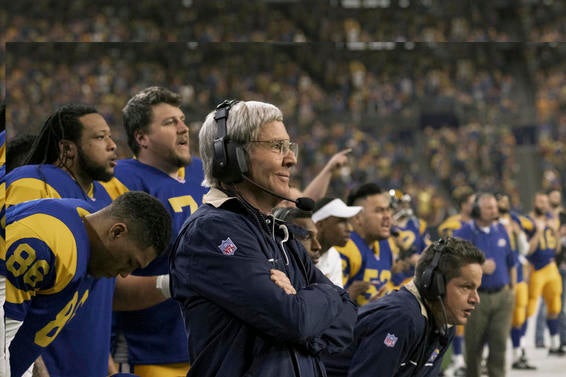
Longtime NFL veteran Calais Campbell, now with the Ravens, anticipates he will as well. The Pro Bowl lineman didn't play with Warner until the latter joined the Cardinals (and admittedly tried to lure Kurt out of retirement back in 2014). But he was always touched by the QB's humanity, humility and commitment to the "bigger picture."
"My very first day in the building, I thought he was a coach," Campbell says. "I was trying to find my way, where to go, and he had the beard and the gray hair, so you think he must be a coach. He helped me out anyway ... Kurt was the guy that you went to when you had questions. My first year, I sat next to him on the plane. I was supposed to be in the back where all the young guys go. But he saw I was 6-foot-8, that I was gonna be uncomfortable, and he let me sit next to him."
Campbell says he and Warner bonded over their Christian faith, which Kurt and Brenda wrestled with -- and have long openly proclaimed -- together. (The Academy Award-winning Anna Paquin, who plays Warner's wife, "was a tenacious bulldog, digging into what made Brenda's faith tick," says director Andrew Erwin.) Campbell, meanwhile, has plenty of reasons to go to the movies; he and his wife used to make a weekly trip to the theater ("I love to eat popcorn, the Red Vines, the slushie, I do it all"), and he'd be all for a sequel about Warner's Cardinals tenure (which Kurt happily endorses). But he's planning to go this Christmas for one reason only: the true inspiration of the Warner family.
The Erwins have a background in faith-based films, most notably music biopic "I Can Only Imagine," but they believe "American Underdog" is built for the masses. Warner instructed them not to make his story "too pretty," if only to preserve the truth: his improbable road to the NFL alongside Brenda may have been fueled by finding identity in Jesus rather than football, but that doesn't mean the road was easy or conventional.
"Most people have their supermarket moment," Kurt says. "We all know the dream is, 'I don't ever want that moment.' But that's not what real life is."
And in that way, Warner believes, his story of overcoming the odds can and should speak to everyone.
"People have said for years, 'Where's the movie at? Why is this movie not being made?'" he says. "There's gonna be a lot of sports fans that come, but they're gonna bring somebody with them that doesn't really care, or has no idea, or they're gonna bring their son that wasn't even born when this was going on. ... I don't think they have any idea what they're gonna get from this movie when they sit down in those seats for two hours."
Now imagine telling all of this to the people who took their seats at Trans World Dome on Sept. 12, 1999, to watch the Ravens play some guy from Iowa.
***
Catch an exclusive behind-the-scenes interview with Zachary Levi, Kurt Warner and the Erwin Brothers right here:


